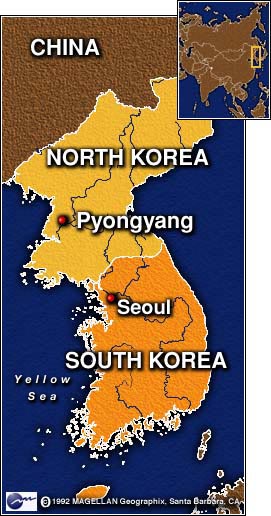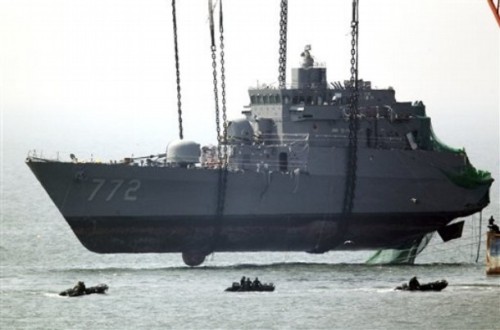
SEOUL, South Korea – For North Korea, the deadly sinking of a South Korean warship a month ago may end up being the perfect crime.
Investigators have yet to produce proof that North Korea engineered the ship’s demise, but analysts say even if they do, Seoul won’t risk triggering another costly war by striking back militarily.
And if there’s no evidence pointing to North Korea, its government may still quietly claim it as a victory to bolster support at home.
As South Korea honored the 46 dead sailors in an emotional farewell Thursday, the question of what struck the Cheonan remained unsolved, casting a pall over North Korea’s relationships with Seoul and Washington and calling into question the future of stalled six-nation nuclear disarmament talks.
The 1,200-ton Cheonan was on a routine patrol mission in the waters near the Koreas’ maritime border when an explosion ripped the sturdy frigate in two. Fifty-eight sailors were rescued; 46 others perished.
The South Korean military was careful early on not to cast suspicion on North Korea, even though the Yellow Sea has been the site of three bloody skirmishes between the two countries, most recently in November. One North Korean was killed in that clash, South Korea said.
Military experts laid out the possibilities: a weapon stored on board? Collision with a rock, a mine left over from the Korean War? Or was it a torpedo fired from a submarine that went undetected by the ship’s sophisticated radars?
Defectors claiming knowledge of North Korean military operations called it sabotage, describing naval squads in slow-moving submarines outfitted with torpedoes. North Korea denied involvement.
The day the ship’s damaged stern was raised from the waters, the chief investigator offered a damaging initial assessment: an underwater explosion.
The investigation still under way, the defense minister said Sunday that an outside explosion — probably created by a torpedo blast near the ship — appeared probable.
The next morning, President Lee Myung-bak vowed tearfully that Seoul would respond “resolutely and unwaveringly” against the perpetrators.
South Koreans are demanding retaliation if North Korea was the culprit.
North Korean leader Kim Jong Il “will pay for what he’s done,” one person wrote on an unsigned note posted on a mourning wall in Seoul. “The blood of the Cheonan warriors stains your hands,” read another addressed to Kim.
Sirens wailed at the start of the funeral south of Seoul on Thursday. The president, his lips pursed, held a fist to his chest during the national anthem. Mothers dropped to their knees in grief before their sons’ portraits.
“We cannot forgive this, must not forgive it and must not forget it,” said Navy Adm. Kim Sung-chan. “We will never sit by idly as this kind of pain is inflicted on our people. We will track them down to the end and make them pay.”
But military officials and experts say the investigation could take weeks, months, even years.
“Investigators don’t want to make any mistakes, especially in such a politically charged atmosphere,” said Joseph S. Bermudez Jr., a senior analyst for London-based Jane’s Information Group. He said experts would need to examine the wreckage for chemical residue and fragments, and analyze the local tides and currents for the previous 30 days — a time-consuming process.
And even if investigators find a smoking gun — a fragment of a North Korean torpedo, for example — Seoul has few good options for retaliation.
“Nonmilitary responses might lead the North to conclude that it could kill South Koreans with impunity,” said John Pike, director of the GlobalSecurity.org defense website based in Alexandria, Virginia. “And the military responses run the risk of further escalation.”
No one wants full-scale war on the Korean peninsula, not even the North Koreans, who know their outdated equipment is no match against state-of-the-art U.S. and South Korean artillery.
Launching a military attack wouldn’t even be up to the South Korean military; they must defer to the U.S.-led United Nations Command, the force monitoring the Korean armistice signed in 1953.
Lee’s only recourse: to squeeze and punish North Korea with sanctions, pressing the U.S. and the U.N. Security Council to follow suit, said Yang Moo-jin of the University of North Korean Studies in Seoul.
North Korea has struck repeatedly over the years. In 1967, it bombarded a naval ship with artillery, killing 39 South Korean sailors. In 1968, commandos stormed the presidential mansion in a failed bid to assassinate the president; seven South Koreans died.
In 1983, a bombing in Burma that killed 21 people but narrowly missed the South Korean president was blamed on North Korea, and in 1987, explosives blew up an airliner with 115 people on board — the worst attack on South Korea since the war and allegedly masterminded by Kim Jong Il himself.
Analysts say if North Korea did wage an attack, it may be part of a political campaign for Kim Jong Il’s successor.
Now 68 and reportedly ailing, Kim is believed to be grooming his son Jong Un to take the communist dynasty into a third generation. Very little is known about the son, both inside and outside Pyongyang, and the regime’s PR machine is likely working overtime to build up his reputation as well as consolidate loyalty for the Kim family.
There are hints of unrest in the notoriously reclusive nation. Millions are going hungry, and sweeping reforms meant to clamp down on private commerce reportedly sparked rare protests. Even the relatively well-fed military is suffering from malnutrition, defector Im Chen-young, a former People’s Army officer, told reporters this week.
If Seoul finds no evidence, North Korean military leaders could still use the sinking to boost troops’ morale by quietly calling it retaliation for the November naval skirmish; credit for the surreptitious mission would go to the heir-to-be, analysts said.
“Factors like Kim Jong Il aging, the economic crisis and internal power struggles intensifying within the government — they’ve put the North Korean regime at the risk of collapse,” the Rev. Kim Sin-jo told the Dong-a Ilbo newspaper while visiting a memorial for the sailors. “In such a situation, an incident like this (the ship sinking) is necessary to ensure power.”
Kim should know. He was one of 31 North Korean commandos who infiltrated the South and stormed the presidential mansion in 1968, one of the most brazen and notorious attacks on Seoul. Kim, now 68 and a naturalized South Korean, was the only commando taken alive.



















